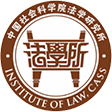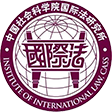 字号:
字号:小
中
大
The Basic Situation and Significance of the Reform of the Supervision System in China
Dr. Chen Guoping, Deputy Director, CASS Law Institute
Ladies and Gentlemen:
It’s my great pleasure to talk about The Basic Situation and Significance of the Reform of the Supervision System in China. Since Xi Jinping was first elected the Secretary General of the Central Committee of the Communist Party of China in November 2012, China has adopted many new anti-corruption measures.one of them is the reform of the state supervision system ,witch has the widest and most profound impact. Today, I would like to give you an introduction to and express my own opinions on the topic.
The first question is about The Process of Establishment of the New State Supervision System in China
The Communist Party of China and the Central People’s Government have always attached high importance to the role played by supervision and established a complete set of supervision system very early on. Before the reform, the main organs responsible for supervision included commissions for discipline inspection under Party committees at different levels and their dispatched organs, the administrative supervision departments of people's governments at different levels, the National Bureau of Corruption Prevention, and the anti-corruption departments under people’s procuratorates at different levels.
For a long period of time, these supervisory organs had played an important role in preventing and punishing corruption. Meanwhile, they had also faced many problems, such as lack of concentration of anti-corruption forces, unreasonable allocation of power, and high operational cost, so the state had been considering the reform of the existing supervisory system for some years.
In March 2018, the Thirteenth National People’s Congress deliberated on and adopted the Amendments to the Constitution of the People's Republic of China (2018) and the Supervision Law of the People's Republic of China. And then, the National Supervisory Commission was officially established and newly appointed members of the commission took office by taking a public oath to the Constitution. Afterwards, supervisory commissions have been established throughout the country from the provincial level down to the county level, thus forming a national supervisory system consisting of supervisory commissions at the national, provincial, municipal and county levels.
The second questiong is about The Differences Between the New and the Old Supervisory Systems
The reform of the state supervision system is not just a merger, increase or reduction of the existing supervisory organs, nor a simple change of it’s functions , but the redesign and restructure of the existing supervisory systems and institutions. As a result, the new system is very different from the old one both in the overall appearance and in the operational mechanism. I’m going to tell you the details:
The first one. The status of supervisory organs among state organs has changed. In the past, state organs at the national level consisted of the National People’s Congress, the State Council, the Supreme People’s Court, and the Supreme People’s Procuratorate. Among them, the National People’s Congress was the highest organ of state power and, under the National People’s Congress, the three others were parallel organs, all of them were elected by and responsible to the National People’s Congress.Now, the new state structure consisting of four parallel organs, namely “the state council, the supreme court ,the supreme procuratorate and the supervisory commission”. the status of supervisory organs at different local levels has also changed.
The second one. The institutional setup of and the leadership relations of supervisory organs have changed. In the past, there were several different organs performing supervisory functions, with each of them having its own leadership relations. These leadership relations were complicated. Now, the National supervisory commission is the highest supervisory organ, and the low level supervisory commissions are under the leadership of the supervisory commissions at high levels only, the leadership relation has been simplified.
The third one. The scope of supervision has changed. Before the reform, different supervisory organs targeted different groups of people. For example, the Ministry of Supervision mainly covered state administrative organs and their staff members, but did not cover the State Council and its leaders.the scope of supervision was too narrow . After the reform, the Supervision Law provides for six categories of targets of supervision, covering all public officials.
The fourth one. The responsibilities and competences of supervisory organs have changed. Before the reform, different supervisory organs had different responsibilities and competences. After the reform, acts of violation of Party disciplines, administrative laws and regulations and duty-related crime committed by public officials are all investigated and dealt with by supervisory commissions. Of course, if a case involves a duty-related crime, it should later be transferred to a procuratorial organ for the initiation of public prosecutiont.
The fifth one. The supervisory measures have changed. Before the reform, different supervisory organs took different supervisory measures in accordance with relevant legal provisions and, apart from anti-corruption departments , no other supervisory organ could take any measure that restricts personal freedom. Under the Supervision Law, now a supervisory commission may take various investigation measures, including the detention of a criminal suspect. Meanwhile, the law also provides for strict conditions, procedures and time limit for the use of such measures, so as to prevent them from being abused.
The third qustion is about The Significance of Establishing the New State Supervision System
The reform of the state supervision system, which aims at giving full play to the functions of supervisory organs and establishing a supervisory system suited to the actual conditions in China, involves major changes of the political system, the political power and political relations in the country.
Firstly, it is conducive to perfecting the state governance system. After the establishment of the new state supervisory system, supervisory organs become independent of administrative and judicial organs. The different kinds of state organs perform their own functions independently of each other, while at the same time checking and balancing each other. This new structure is more in line with the standard of a good state governance system.
Sekondly, It is conducive to giving full play to the function of supervisory organs. The new system has improved the status of supervisory organs and enhanced their authority. Meanwhile, it has also solved many problems resulting from the establishment of several different types of supervisory organs, thus becoming a more powerful and efficient supervisory system.
Thirdly, It is conducive to ensuring the performance of duties by supervisory organs in accordance with law. The Supervision Law provides that the supervision work must strictly comply with the Constitution and laws, equally apply laws to all parties, and guarantee the parties' lawful rights and interests. Especially the measures for the “detention” of suspects of duty-related crimes can be taken only when the necessary conditions are met . Finally, the rule on the exclusion of illegally-obtained evidences and the protection system of supervisory targets’ rights and interests must be introduced, so as to effectively prevent the abuse of supervisory power and truly bring its operation under the rule of law.
中国监察制度改革的基本情况及意义
——在俄罗斯第八届欧亚反腐败论坛上的主旨演讲
中国社科院法学研究所 陈国平
(2019年3月19日)
从2012年11月习近平第一次当选中共中央总书记以来,中国在反腐败方面采取了很多措施,比如加强对公职人员的教育培训,减少政府行政审批事项,严厉惩治腐败官员,改革国家监察体制,等等。其中,以国家监察体制的改革牵涉面最大,影响最为深远。今天,我想就这方面的情况做些介绍,并谈谈我的看法。
一、新的国家监察体系建立的过程
中国共产党和中央人民政府历来重视监察的作用,很早就建立了一整套监察体系。在这次改革之前,专门负责监察的机构主要有:各级中国共产党的纪律检察委员会及其派驻机构,各级行政监察部门,国家预防腐败局,各级人民检察院的反贪局等。
长期以来,这些监察机构在发挥监察作用、预防和惩治腐败方面都发挥了很大的作用,但同时也存在反腐败机构力量分散,权力配置不合理,制度运转成本高等问题。于是,国家就考虑对监察体制进行改革。为了稳妥起见,从2016年10月开始在北京、山西、浙江三省市先行开展监察体制改革试点工作。经过两年多的试点,这项改革取得了成功,于是决定在全国正式建立新的国家监察体系。
新的国家监察体系是由新的宪法修正案和《中华人民共和国监察法》确立起来的。2018年3月,十三届全国人民代表大会第一次会议先是审议通过了《中华人民共和国宪法修正案》,后又审议通过了《中华人民共和国监察法》。3月23日,国家监察委员会揭牌,新任国家监察委员会领导人员进行宪法宣誓。随后,从省到市到县每一级都设立了监察委员会。这样,在全国范围内就形成了国家、省、市、县四级监察委员会构成的监察体系。
二、新的监察制度与旧的监察制度之间的区别对国家监察制度进行改革,不是对已有的监察机构进行简单的合并与增减,也不是对已有的监察机构的职能进行简单的调整,而是要打破已有的监察体系与制度进行重新设计,因而新的国家监察制度在整体面貌与运行机制上与过去相比都发生了很大的变化。具体来说,表现在以下几个方面:
(一)监察机关在国家机构中的地位发生了变化。过去,在国家层面,国家机构的组成是全国人民代表大会、国务院、最高人民法院、最高人民检察院,其中全国人民代表大会为最高权力机关,在全国人民代表大会之下形成“一府两院”的格局。现在,国家监察委员会与国务院、最高人民法院、最高人民检察院一样,都是由全国人民代表大会产生、对全国人民代表大会负责的机关,因而四个机关是并行的,这样就形成了在全国人民代表大会之下“一府一委两院”的新格局。在地方层面,各级监察委员会的地位也相应地发生了变化。
(二)监察机关在机构设置和领导关系上发生了变化。过去,履行监察职能的有几个监察机构,不同的监察机构有不同的领导关系,比如,行政监察部门对本级人民政府和上一级监察机关负责并报告工作,监察业务以上级监察机关领导为主,这样领导与被领导的关系是比较复杂的。现在,由于统一设立监察委员会,监察委员会明确上级领导下级,领导关系变得简单了。
(三)监察范围发生了变化。过去,不同的监察机关有不同的监察对象,如党的纪律委员会的监察对象是党员,已经实现了全覆盖,但依照行政监察法的规定,行政监察对象主要是行政机关及其工作人员,还没有做到对所有行使公权力的公职人员全覆盖,而且监察部不能对国务院及其领导人实施监察,监察的范围过窄。现在,《监察法》明确了六类监察对象,包括了所有行使公权力的人员,这些人员统一由监察委员会监察,实现了国家监察机关对所有行使公权力的公职人员的全覆盖。(四)监察职责和权限上发生了变化。过去,不同的监察机构各有各的职责和权限,如党的纪律检查委员会的职责是对党员违反党的纪律的行为进行调查和纪律处分,如果调查后发现还有职务犯罪行为的要移送检察机关进行调查;行政监察机关对违反行政纪律和法律的进行调查和政务处分,如果调查后发现还有职务犯罪行为的也要移送检察机关进行调查;如果仅有职务犯罪嫌疑的,要由检察院进行侦查、批准逮捕和提起公诉。现在,违纪、违法、职务犯罪则统一由监察委员会进行调查和处理。当然,如属职务犯罪,调查后再移送检察机关依法提起公诉,由审判机关进行审判。
(五)监察措施发生了变化。过去,监察机关各自按照有关的规定使用监察措施,这些监察措施各有不同,而且除了检察院的反贪部门可依法使用限制人身自由的“留置”措施外,其他部门不能使用。现在,《监察法》规定了监察委员会可以统一行使包括“留置”在内的各种调查措施,当然同时也规定了严格的适用条件、程序和期限,不得滥用。
三、建立新的国家监察体制的意义
这次对国家监察体制的改革,目的是充分发挥监察机关的监察效能,建立适合中国实际情况的监察体系和监察制度,涉及政治体制、政治权力、政治关系的重大调整,是与时俱进的重要制度创新,因而具有非常重要的意义。
(一)有利于国家治理体系趋于完善。一般来说,一个完善的国家治理体系,应当是各个国家机关的职责分工明确,相互之间的制约关系清楚,上下级之间的领导关系相对简单的一个体系。新的国家监察体系建立之后,监察机关独立于行政机关和司法机关,行政的归行政,监察的归监察,司法的归司法,各不相统属,同时又互相制约,而且各自上下级之间的领导与被领导关系是相对简单的,这样一种结构更加符合完善的国家治理体系的标准。
(二)有利于充分发挥监察机关的监察效能。新的监察体系提高了监察机关的地位,增加了监察机关权威;同时,也改变了过去由于几个监察机构分设而导致的权责不清、职能交叉重叠、监察环节衔接不畅、不能形成有效合力的状况,因而成为一种更加权威、更加统一也更加高效的监察体制。
(三)有利于监察机关依法履行监察职责。监察法规定国家监察工作要严格遵照宪法和法律,以事实为根据,以法律为准绳;在适用法律上一律平等,保障当事人的合法权益。还规定监察机关要严格按照程序开展工作,充分体现程序合法的原则;特别是对职务犯罪嫌疑人采取“留置”措施要符合严格的适用条件和审批程序,引入了非法证据排除规则和监察对象权益保护制度,这些可以有效地防止监察机关滥用监察权力,使国家监察机关行使监察权真正走向法治化的道路。



